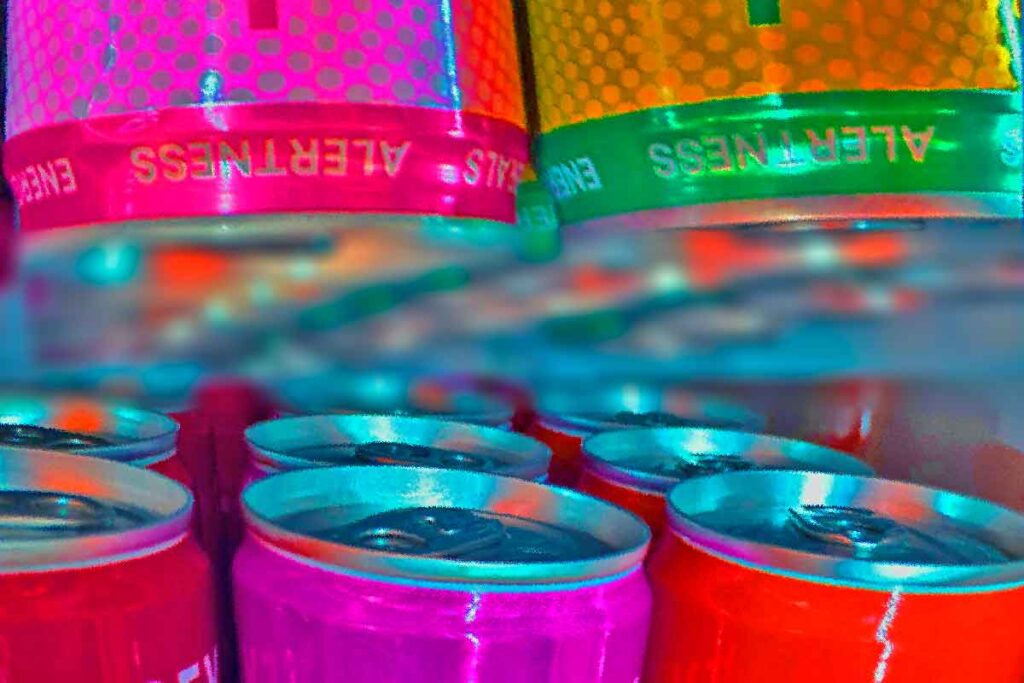I just can’t get over the popularity of Liquid Death. I love coffee, but — is this what it’s come to? Apparently, the answer is, “Yes.” People want stimulants in all kinds of forms. We’ve had the likes of Red Bull and 8-Hour Energy bottles for a while. But now we have the healthy soda alternatives, offering that spike of energy, but in a gentler way. Note the antioxidants!
But, are these drinks masking energy drink dangers?
As we’ve seen with probiotic sodas and mood-enhancing sodas, you can find drinks with genuinely helpful ingredients. But to know what you’re getting, you have to dig in. Once again, we’re turning to registered dietitian Carole Havrila at UVA Health for expert guidance.
What Do Healthy Soda Energy Drinks Claim to Do?
These drinks offer alternatives to coffee and the more, shall we say, hardcore products at your local 7-11. They promise energy, stamina, and even cognitive enhancements without the crash and burn from coffee or added sugar in popular teas.
Many of these brands claim to:
- Have ingredients from ‘natural’ sources
- Lack artificial flavors
- Better your workouts
- Improve focus and memory
- Help your mental sharpness
- Keep you awake
All of this sounds wonderful. Do these sodas actually deliver?
What’s In These ‘Healthy’ Energy Drinks?
My own trip through the grocery aisle made my eyes cross. I recognized the usual caffeine sources:
- Green tea
- Matcha
- Yerba mate tea
And I wasn’t surprised to note another typical component in these drinks: Vitamins B3, B5, B6, and B12. These all help your body turn food into energy.
Natural Chemicals
But many of these alternative drinks list varieties of amino acids and chemicals I didn’t know. When I looked them up, I didn’t always find the clearest definitions.
These more scientific-sounding ingredients are chemicals your body makes naturally. Companies make various claims about their ability to boost your brain health. Ones to watch for:
- N-Acetyl-L-Tyrosine, a form of L-tyrosine, a non-essential amino acid
- Claims: Increases memory and thinking under stressful conditions
- Alpha-GPC, a chemical your body makes out of choline, an essential nutrient
- Claim: Improves memory, learning, focus, and athletic performance
- Uridine, a nucleoside made in your liver that plays a role in body temperature regulation
- Claim: Boosts brain health and mood
- Ketones, an energy-giving chemical that comes from broken-down fat when you don’t have enough glucose to make energy
- Claim: Gives extra energy, improves thinking
- BCAAs, essential branched-chain amino acids (leucine, isoleucine, valine) that your muscles burn for energy
- Claim: Gives extra energy; may decrease muscle soreness after exercise and stimulate protein synthesis
Energy Drink Dangers
At best, the supplements do what they say. Most often, however, you’re probably not getting the kind of powerful brain and body boosts promised. Remember, the supplement industry is largely unregulated. That means the claims they make haven’t been proven — at least not by scientists with an interest in selling supplement products.
You might think the fact that the supplements are ‘natural’ means they’re safe. But whether a chemical is natural or not doesn’t make a difference. Too much of a good thing can still be too much.
You’ll want to talk with your doctor about the amounts of these supplements found in what you’re drinking. Your body is probably producing the right amount already, on its own.
The Health Risks of Too Much Energy
Do any of these ingredients pose health risks? Havrila explains that too much caffeine, in any form, can be dangerous. When energy drinks add in other energy-boosting ingredients, the amount of caffeine could be too much for your body to handle.
“Excessive caffeine in some of these drinks, combined with ingredients that may also boost energy intake, can cause heart issues (abnormal heartbeats, increased/unsafe blood pressure), dehydration, worsen anxiety, and interfere with sleep,” Havrila says. She advises moderation.
This isn’t to say that energy alternatives don’t have benefits. Green tea and matcha, Havrila notes, offer healthy antioxidants and compounds. You’ll just want to watch how much you drink, as they tend to have more caffeine than normal tea or coffee.
“There are known deaths that have occurred due to excess consumption of these drinks due to cardiac arrest,” Havrila warns.
Could a Pick-Me-Up Bring You Down?
Is your coffee addiction healthy?
How to Avoid Too Much Caffeine
Balance is key. “Brewed green tea in moderation is safe,” says Havrila. “But in larger amounts it can affect blood thinning, iron absorption, and may interact with some medications.”
Another risk to watch for: Regularly drinking large amounts of yerba mate “can increase risk for several cancers and interfere with some cancer, blood pressure, and depression medications.”
Risks to Consider With Any Supplements
As with anything in your diet, you’ll want to consider:
- Medication interactions — especially with blood pressure, anxiety, and blood-thinning medications
- Allergic reactions — can happen with added ingredients, including botanicals and herbs
- Added sugar — even ‘healthy’ drinks tend to contain sugar, adding extra calories
- Extra caution if you’re breastfeeding or undergoing medical treatment
